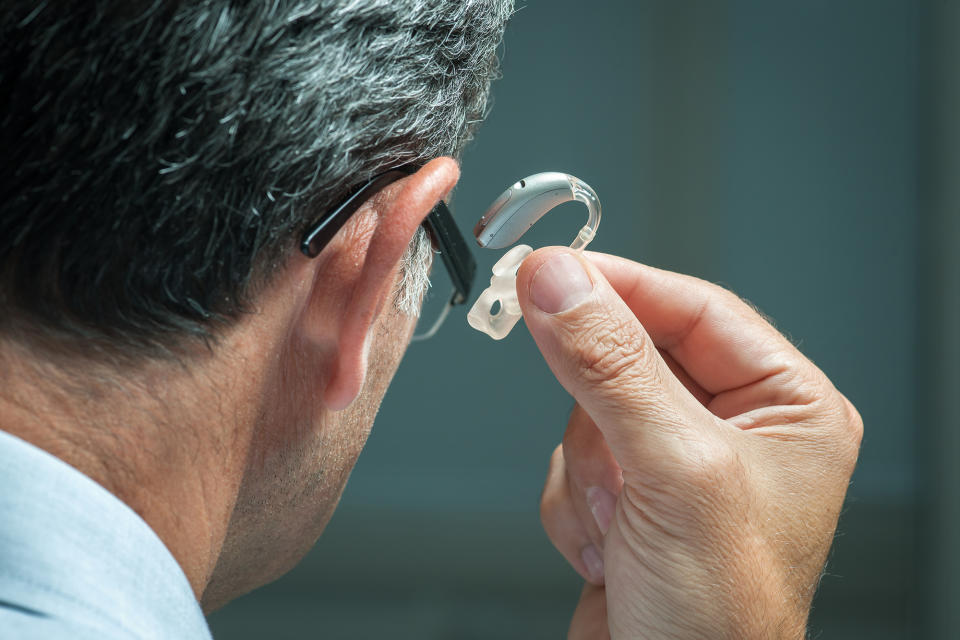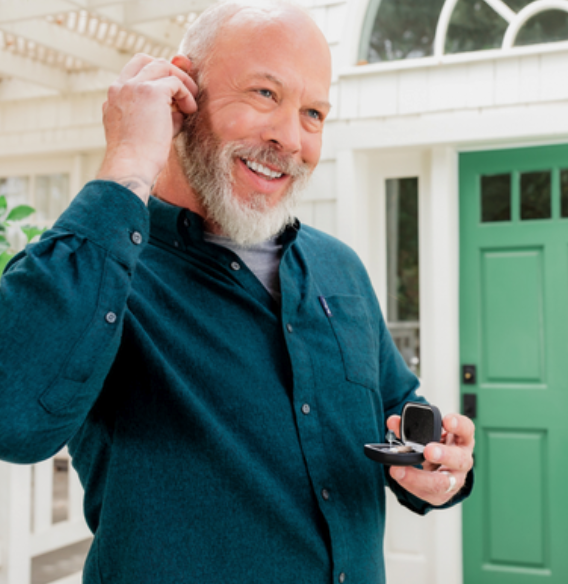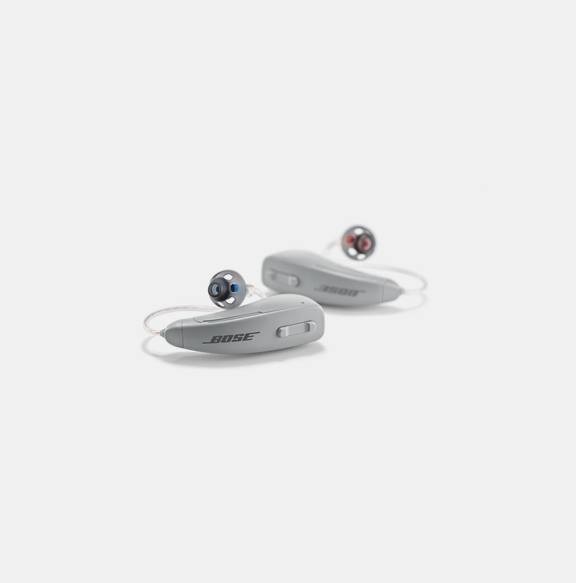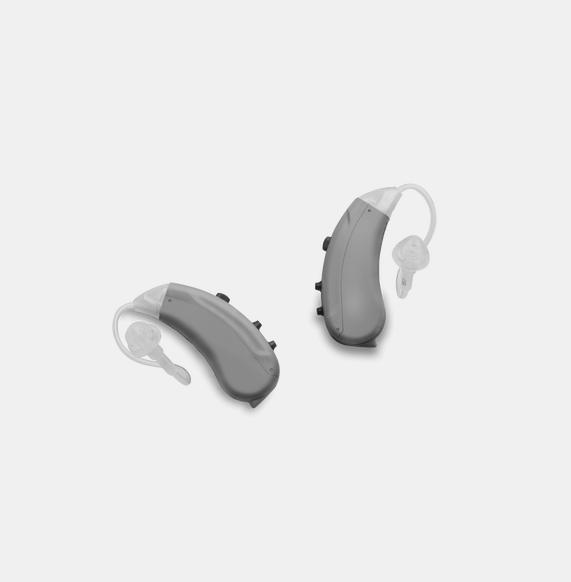Over-The-Counter Hearing Aids Are Now Legal in the US, Here’s What That Means For You

On August 16th, 2022, the FDA finalized a historic ruling that legalized and enabled access to over-the-counter hearing aids, which will officially go into effect on October 17th, forever altering hearing care in the United States.
The FDA, through this ruling, explained that “In creating a regulatory category for OTC hearing aids and amending existing rules, we intend to provide reasonable assurance of safety and effectiveness for these devices as well as foster access to, and innovation in, hearing aid technology, thereby protecting and promoting the public health.”
Today's Top Deals
You Can Buy the iPad 9 for Just $269 During Prime Day - Prime Members Only!
Amazon's Fire HD Tablets for Kids & Adults Start at Just $45 Right Now
This #1 Best-Selling Mixology Kit Is Just $33 During the Prime Early Access Sale
Critical hearing care devices previously only available through prescription from a licensed professional will be available to buy online or at your local pharmacy just like Advil, Kleenex, sunscreen and cough medicine. This is a welcome change for aid-curious consumers who previously had to go through the somewhat laborious process of visiting a doctor or audiologist before accessing assistive hearing devices.
Over-The-Counter Hearing Aids: Explained
There are both negative and positive aspects to a ruling like this, both for healthcare providers and patients. According to one of our experts, Nicholas S. Reed, an audiologist and assistant professor at Johns Hopkins School of Medicine, and literal author of the book Hearing Loss for Dummies, there are between 38-45 million Americans experiencing hearing loss. He’s spearheaded the research on hearing care that served as the public health foundation for the legislation regarding over-the-counter hearing aids, and remarked that while it took them long enough, the access to these devices is incredibly needed and long overdue.
When asked about his reaction to the ruling, Reed clarified that even though he’s an audiologist himself, a group mixed on this ruling, he’s biased due to his areas of research. He cited a study conducted by a health economist on his team that looked at hearing aid use over an 8-year period, and found that for those at 200% or more above the poverty level there was a 33% increase in hearing aid use, while those at 100% below the poverty level saw a 13% decrease.
“And this is kind of scary, actually, when you think about it, at the same time as this study period is looking at, it’s from 2011 to 2019, we actually see the biggest expansion in MedicAid in the history of the United States. We’re literally pushing hard to cover that lowest income bracket, and yet we see hearing aid use going down in that group.”
He’s hopeful that over-the-counter hearing aids will help narrow this care gap, and explained that OTC is also the market’s way of catching up with the technology that exists today, and hopefully will lower costs, break up a monopoly of five companies that essentially owns the space, and hopefully make it easier for consumers to access the care they need.
Like any large medical ruling, it also brings up a lot of questions and concerns.
What does this mean for the future of hearing care in the U.S.?
Are all OTC hearing aids safe to use?
Should you still see a doctor to make sure the device you picked is right for you?
In this piece we’re going to give an overview of what this ruling means, how consumers can best navigate this new space and what experts in the industry anticipate happening in the future. We’re going to include brands that experts recommend, as well as expert advice on navigating this new market.
As with anything medical related, we recommend speaking with a specialist and/or medical professional before adding a new device, supplement or regimen to your care routine.
Editor’s Note: Some expert quotes have been lightly edited for grammar and clarity.

Types of Over-The-Counter Hearing Aids: An Overview
First of all, we think it’s important to clarify the type of hearing aids that are available, in general, and specify the ones that are covered by this ruling and now available over-the-counter. All hearing aids can fall within a few different form and technological categories, regardless of whether they need a prescription or not.
OTC Hearing Aids
The ruling created a whole new category of hearing aids, OTC hearing aids, that are differentiated by other hearing care devices by their level of audibility, or, in other words, how loud they can amplify sound. They can’t amplify as loudly as prescription hearing aids, for the safety of the public. You’ll be able to fit them yourself, adjust the sound level and some come equipped with a smartphone app that enables you to do your own hearing test and receive your own prescription for your unique hearing needs.
The FDA ruling came with many requirements for hearing aids to be approved for OTC sales, including that they can only be sold to those over the age of 18, contain instructions for what to do if the device is malfunctioning or causing pain, and urge users to consult professionals in certain settings. Other requirements regarding individual user safety include:
Output sound pressure level not exceeding 90
General output level not exceeding 111 decibel sound pressure level
Self-generated noise level cannot exceed 32 decibels
Prescription Hearing Aids
All hearing aids that don’t meet the requirements above, a.k.a ones that amplify at higher volumes and are designed for those with moderate-severe hearing loss, will still require a prescription.
Personal Sound Amplification Products (PSAPs)
PSAPs are another classification of hearing aid device that aren’t hearing aids, per se, but rather devices to help amplify certain sounds in specific environments. They can help bird waters pick up certain calls, for example. They’re not medical devices and not regulated by the FDA.
Read More: The Most Comfortable Headphones of 2022

Prepare For Your OTC Hearing Aids to Get Cheaper and More Effective
How will this help the consumer? Reed explained that currently there are five companies that own the entire hearing aid space — from the devices themselves, to the pharmacists to the audiologists that fit them for patients. And this is nonsensical, especially due to the fact that many hearing aids can now be programmed with a smartphone in a safe, effective way.
The Tech is Safe, Audiologists Have to Adapt
“We now have digital hearing aids that can honestly be programmed with smartphones, and they’re efficacious. We know that they work pretty well. Cost and technology are different things, just because it’s sold direct to consumer instead of sold by a professional doesn’t change the tech.”
He also explained that in order for products to innovate as best they can, this “oligarchy” of five companies must be broken up.
“This would be illegal in any other case in healthcare but for some reason in hearing care, that’s how it’s become. And so this needs to be broken up to really see innovations in market delivery patterns, devices that are out there. We’ve become so stagnant that we have a fence where essentially you’re on one side or the other, and we need a pyramid. We need different steps and different entry points to meet people where their needs are.”
Innovation is Easier, New Companies Can Break In
“What OTC does is it’s not just going to decrease costs, it’s also going to break this market. Because right now, if a player wants to get involved…if Samsung wants to make a hearing aid today they have no market to sell to. They have to sell to those audiologists and hearing aid dispensers because they’re the ones who are going to sell and recommend your device to their customers and patients,” said Reed.
“And with such a rigid and vertically-integrated market there’s no breaking that in. And so what OTC does is allows for direct sales. It really changes the entire market and I think overall this is a really strong market-shaping strategy to change hearing care fundamentally in the U.S. by decoupling the provider from the actual device.”
Read More: The Most Comfortable Headphones of 2022
This Doesn’t Really Help Those With Severe Hearing Loss, Here’s Why That’s a Good Thing
I also asked our experts who this will help the most, and Reed noted that this is unlikely to help those with severe hearing loss who are already equipped with prescription-level devices.
Instead, this ruling is more likely to target those with mild-moderate hearing loss, who have the lowest levels of hearing aid uptake.
“The bigger group are people sitting earlier on in their life, they’re in their mid-60, mild hearing loss and they’re curious about this, and they’ve haven’t been able to access it yet, they’re going to jump in and have a chance to do something.”
He went on to explain that “in the immediate, we’re going to see effects for those who are curious, those who are putting it off, they’re the ones who are going to have a chance to do something about this,” said Reed.
“The biggest change is for people who are early on in their hearing loss and they’re just noticing these small changes. Hearing loss happens insidiously and slow, it can happen at higher frequencies, it’s hard to, you don’t notice it at every part of your life. With mild hearing losses, you and I having a conversation in a room, face to face, is fine. But if we had that same conversation in a boardroom where we’re sitting far apart, or if we’re sitting in a restaurant, we’ll see these barriers that make it suddenly harder to hear and access that information and process that sound.”
Audiologists Are About to Become Even More Important
“I know a lot of providers are upset about this but I actually think it’s really good for them too. The analogy I use, and I know that hearing aid specialists and audiologists hate this analogy, but this really is kind of like cars. If you can imagine, right now, basically we, audiologists, are seen as car salesmen. And that’s because all of our services are wrapped up in the sale of the hearing aid. We don’t even get reimbursed for our services, no one sees it, it’s just ‘hey, you sold me this device, and all the value is placed in the device,” said Reed.
“When you decouple the device from the services, then you start to see that professional differently. So you move from car salesman to car mechanic. Nobody in society has this big respect for car salesmen, I mean no offense to them, they’re wonderful and they serve a need, but overall we’ve sort of stigmatized them. Whereas car mechanics, if you know a good car mechanic you almost want to hide it from people because it’s so important.”

Where Can I Buy Over-The-Counter Hearing Aids Online?
Across the board, our hearing experts said that a lot of the market development for the introduction of new hearing aids and new brands to the space is yet to come, so there isn’t a ton available online at the moment. However, they did offer some guidance in terms of where to purchase hearing aids, and how to shop for them if you’re interested in purchasing one yourself online.
We spoke with De Wet Swanepoel, Professor of Audiology at the University of Pretoria and the Ear Science Institute of Australia and Editor in Chief of the International Journal of Audiology about what consumers should look for when shopping for hearing aids, and if there are any brands he recommends.
“The best hearing aid is the one you wear, and you’re most likely to wear it if it’s comfortable and effective.”
He also offered this list of what to look for, with emphasis added by SPY editors.
Invest in a digital hearing aid, which will have better features and functionality than analog hearing aids.
Look for self-fit technology. A person’s hearing is as unique as their fingerprint, and self-fit technology provides a more customized, and therefore more clinically accurate solution.
Look for a hearing aid that comes with free, remote support, so that you ’re never left in the lurch. One of the benefits of over-the-counter hearing aids is that you don’t have to rely on an audiologist for tuning and service. So you want a device that gives you substitute service in case you run into any challenges.
If your hearing aid runs from a phone app, review the App store ratings before purchasing. Make sure there’s a track record of happy customers.
I also asked Professor Swanepoel if he had any brands he recommends, and he noted that the “Lexie Lumen and the Lexie B1 Hearing Aid powered by Bose are both great options for people with mild to moderate hearing loss.”
“Lexie’s award-winning platform comes with real-time support six days a week through voice or video calls. The app also gives users control over their hearing with volume and environment settings. Lexie also offers a unique rewards program that incentivizes users to wear their hearing aids,” said Professor Swanepoel.
Lexie x Bose B1 Hearing Aid

The Lexie B1 hearing aid is Lexie’s more expensive, but more compact, option that’s in-canal and delivers Bluetooth-enabled, customized hearing care to each patient. It pairs with the Lexie app, an iPhone or Android app that’s programmed to provide audiologist-quality individualized hearing care. Note: Lexie is about to launch an upgraded version of this hearing aid, the B2, which will be available online and in stores later in October.
Lexie B1 Powered by Bose
Lexie x Bose Lumen
The Lumen is slightly less expensive because it’s not in-canal, but rather behind-the-ear, but provides the same high-quality hearing care as the B1. It also pairs with the Lexie app, automatically adjusts to your individual hearing profile and needs, and is perfect for adults 18+ in age with mild-moderate hearing loss. It also comes in five neutral shades including gray, silver, beige and black.

Lexie Lumen Hearing Aid
OTC Hearing Aid FAQ: Answered By Experts
1. How Much Should You Expect to Pay For an Over The Counter Hearing Aid?
Over-the-counter hearing aids can cost anywhere from $700 to $4,000, on average, according to our experts. The ultimate price depends on the quality of equipment, technological capabilities and amount of custom fitting you get from an audiologist.
When thinking about hearing aid prices, it’s crucial to consider what you’re buying. You’re purchasing the ability to hear your loved ones clearly, understand things fully in meetings and navigate the world a little easier. In short, you’re purchasing a massive lifestyle change for the better. Keep this in mind as you navigate the world of purchasing an aid for yourself.
2. What Are The Most Important Features You Should Look For When Selecting Over-The-Counter Hearing Aids?
We outlined a few crucial features above, but here are a few more to keep in mind according to the experts we consulted for this piece.
Adjustability
Hadassah Kupfer, Doctor of Audiology at the City University of New York — The Graduate Center, noted that adjustability is “essential” so that your hearing aids fit well, have the clearest sound possible, and you’re not sacrificing anything by not necessarily seeing a professional for a fitting.
Warranty
A warranty was one of two most-important things Reed noted when discussing shopping for hearing aids. He explained it’s “because without the state-level licensure laws of, essentially, having a licensed individual prescribing and dispensing, we sort of lose some of the warranty laws that are mandated at the state level. And so I think a warranty is vital here, a company that stands behind their product.”
Features
Dr. Brent Edwards PhD, the Director of the National Acoustics Laboratory in Sydney, Australia noted that there are a lot of different possible features for OTC hearing aids. “think about what features are important to you. Do you want your OTC hearing aids to be able to stream calls from your phone? Do you want it to be discreet looking? What about rechargeability vs having to replace batteries every few days? Some OTC hearing aids will allow you to still contact a hearing professional through phone calls, video chats or texts if you have difficulties—decide if that is important to you.”
3. When Will Over-The-Counter Hearing Aids Be Available?
The FDA ruling took place in August, and it will officially go into effect on October 17th, which means that over-the-counter hearing aids could begin to appear in stores as soon as next week. Some are already available online, and we expect many more brands to enter the space over the next few. years.
4. Where Can I Buy Over-The-Counter Hearing Aids?
You can currently buy them on Amazon and individual brand websites. We’re not entirely sure where they’ll be sold in stores yet, but your local chain drugstore or pharmacy is a safe bet.
5. What Will Happen Next With Over-The-Counter Hearing Aids?
I also asked a few of our experts what they hope happens next with over-the-counter hearing aids, and Reed noted that the expansion of healthcare coverage to other devices as well as services is what needs to come after this ruling.
“the next shoe to drop is coverage of services, and particularly we’re talking about Medicare. And specifically I think two things have to happen. We need coverage of the devices for those whose needs OTC hearing aids don’t meet,” said Reed.
“But two, we’ve got to cover services. If we really want to see OTC thrive, if we have the complimentary service coverage, whether it’s a set number of visits per year, whether it’s Medicare covering a certain number of services per year, whatever it is, I think if they’re doing it agnostic of the device and just letting the professionals be the professional, whether it’s counseling, fitting, service and maintenance — I think these are all important.”
For more information on buying hearing aids over the counter, we recommend consulting the FDA and National Institute of Health‘s website.
More Top Deals from SPY
Best of SPY

